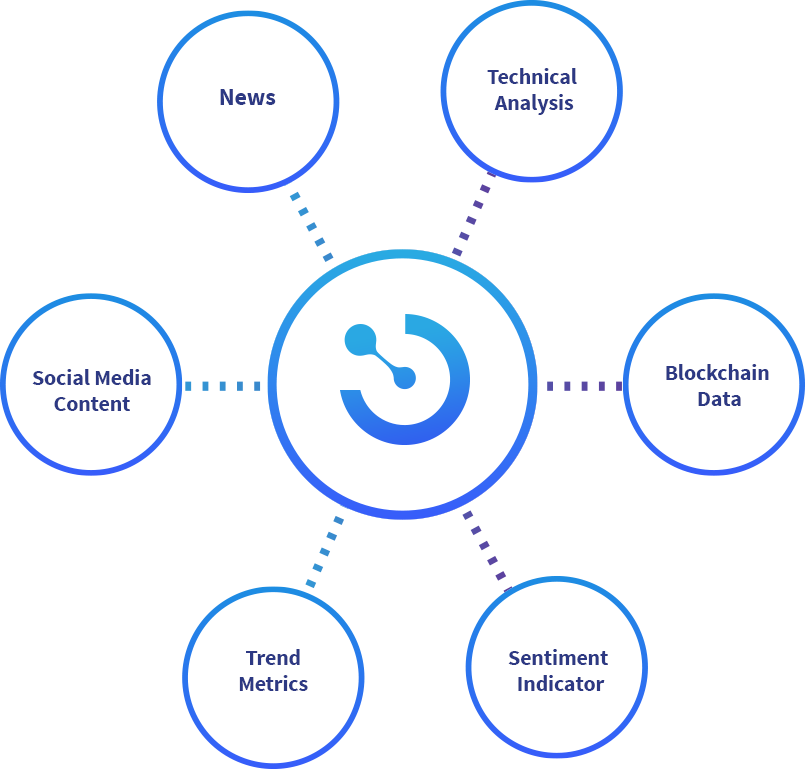What Is ChainLink? How Does It Work?

- By Pierre-Alexandre
August 12th, 2019
Here’s everything you need to know about ChainLink, how it is working, its latest developments and official partners.
ChainLink is the first-of-its-kind platform which solves a unique problem of the blockchain industry by establishing a bridge between the blockchain-based smart contracts and the real-world data. The native cryptocurrency of the ChainLink platform is called the LINK token.
ChainLink was first launched two years back in June 2017 by a SanFrancisco-based FinTech startup called SmartContract. But to understand ChainLink in detail, let us look at the underlying problem with smart contracts.
Although the concept of smart contracts is pretty old, it got revolutionized after Vitalik Buterin launched the Ethereum blockchain in 2015. Besides, the traditional use-case of blockchain for financial transactions, smart contracts opened up new frontiers for a plethora of blockchain-based enterprise solutions.
The problem with smart contracts is that they can only handle data available on the blockchain. This proved to be a major barrier for businesses to adopt blockchain as a majority of their data is currently available on cloud platforms in the forms of data feeds, APIs, etc.
To solve this crucial problem, ChainLink was developed. ChainLink allows smart contracts to make use of the blockchain network’s oracles services and retrieve data from off-chain applications like data pools, APIs etc. These oracles then bring this data on-chain to integrate it with the smart contracts.
Thus the “oracles” serve as middleware or a gateway helping smart contracts to establish a link with the off-chain data. The smart contracts then use this data to trigger the necessary actions as pre-programmed into them.
How Does ChainLink Work?
To understand ChainLink, we need to understand its two main architectural components: on-chain infrastructure and off-chain infrastructure.
Chainlink On-Chain Infrastructure
ChainLink’s on-chain components consist of on-chain oracle contracts which are deployed on the Ethereum blockchain network. The oracle contracts process the data requests for users who want to access the off-chain data.
For this, the user submits a contract request to ChainLink’s network which later processes them into its own contracts. ChainLink matches the uses contracts with the oracles suitable for the application.
There are three basic kinds of contracts:
- Reputation Contracts: These contracts check and verify the authenticity of the oracle provider.
- Order-Matching Contract: These contracts log the user contract agreement on the network, and in turn, receive bids from the oracle providers.
- Aggregating Contracts: These contracts aggregate the data from the selected oracles and later balance them for the most accurate results.
With these contracts in place, the on-chain functions of the ChainLink network have to undergo a three-step process.
- Oracle Selection: Upon submitting a users contract, the user specifics a set of requirements and parameters like any specific data or resources, oracle reputation, and so on. These requirements of the data search are referred to as service level agreements (SLAs).
ChainLink also allows users to manually search for the required oracles. In the absence of the manual search, ChainLink provides an automated matching engine wherein oracles bid on the SLA.
Once the contract receives enough quality bids, the oracles are selected and later a service agreement is initiated. - Data Reporting: This is a relatively simpler job. The off-chain oracles perform the functions within a service agreement and forward the requested data on the blockchain allowing the on-chain nodes to process it further.
- Result Aggregation: This does the job of securing data integrity and prevent tampering. Here the aggregating contract collects entire data submitted by the bunch of oracles associated with the requesting contracts.
The job of the aggregating contract is to average out all the collected information and provide the requesting contract with an accurate and weighted answer.
Chainlink and Off-Chain Infrastructure
As the name suggests, ChainLink’s off-chain nodes collect data from off-chain resources as requested by the user contracts. The ChainLink Core then help the off-chain nodes to process all the relevant data. The ChainLink Core node software facilitates interaction between the ChainLink blockchain and the off-chain infrastructure.
After completely processing the data, the ChainLink Core transfers it to on-chain oracle contracts for the result aggregation. For doing their job successfully, the off-chain oracles get paid in LINK tokens.
Apart from this, the off-chain oracles let developers integrate some external adapters. These external adapters are equally important to the ChainLink platform just like the DApps are to the Ethereum platform. These adapters basically serve as plugins allowing node operators to accommodate additional programs to several different operations. They also perform additional subtasks and streamline the entire data collection process.
ChainLink’s off-chain oracle nodes are its second components connected to the Ethereum blockchain network. At present, ChainLink acts as a bridge only to the smart contracts running on the Ethereum blockchain network. However, in the future, it plans to be completely independent and work with smart contracts across other blockchain platforms.
ChainLink’s Latest Partners and Developments
This year, ChainLink has inked some important partnerships giving a major push to connecting the decentralized platform with the real-world enterprise-grade databases.
- In June 2019, Google Cloud officially announced the ChainLink integration to develop hybrid blockchain-cloud applications. Google announced that it would be using ChainLink as a bridge to connect its native cloud service BigQuery with Ethereum-based smart contracts. You can read more about it in the link provided below.
Learn how to use Chainlink services to provide data from #BigQuery crypto public datasets on-chain, which helps reduce inefficiencies & enables new on-chain business models to emerge by adding entirely new capabilities to Ethereum smart contracts ↓ https://t.co/yVekclgafQ
— Google Cloud Platform (@GCPcloud) June 13, 2019
- Following Google Cloud, ThunderCore - the EVM compatible blockchain platform also announced its partnership with ChainLink. ThunderCore helps developers to build an ecosystem and turn those decentralized applications (DApps) into “full-fledged businesses”.
- The recent addition to ChainLink’s list of partners is OpenLaw Finance. In an attempt to democratize the traditional financial systems, OpenLaw will use the ChainLink services to create a complete ecosystem for tokenized real estate, legally compliant tokenized securities, smart derivatives, and other things.
- In the latest development, public blockchain network Ziliqa has joined hands with ChainLink for allowing its on-chain smart contracts to interact with the external data. As part of this partnership, ChainLink will be providing a custom adapter to let users and developers easily access the data feeds they require.
- The Standard Tokenization Protocol (STP) plans to integrate with ChainLink’s decentralized oracle solutions to create an infrastructure of a globally compliant tokenized assets. This way the STP plans to “unlock liquidity for trillions of dollars in global assets”. The smart contracts on the STP network will use ChainLink oracles to gather reliable and secure information about contract details, asset price, etc.
LinkPool Announces the ChainLink Marketplace
As part of its latest product offering, LinkPool has announced the ChainLink marketplace that acts as a one-stop destination for all ChainLink developers, node operators, and others.
With the ChainLink Marketplace, LinkPools plans to empower the end-users to easily search for resources and connect their contracts to the external real world. The Marketplace will allow to list the entire ChainLink ecosystem and the end-users can look for the desired resources without wasting much of their time.
This project is likely to serve a great purpose and will help small and big businesses quickly adopt the use of the blockchain technology. Besides, it will also considerably reduce the time required to connect to the Node operators making the entire linking process seamless.
ChainLink (LINK) Token Performance
ChainLink’s native cryptocurrency LINK has shown good performance with the growth of its blockchain project. LINK is currently the 17th most valued digital currency with a market cap of $891 billion. Since the beginning of 2019, the LINK token price has appreciated by over 700%.





